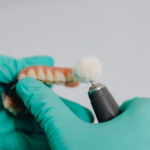Smoking is a major health hazard, and it’s not just bad for your lungs. It also wreaks havoc on your oral health. If you’re a smoker, it’s important to understand how smoking affects your teeth, gums, and overall oral health.
Here are some of the ways smoking can damage your oral health:
- Tooth discoloration: Smoking stains teeth and can make them appear yellow or brown.
- Gum disease: Smoking weakens your immune system, making you more susceptible to gum disease. Gum disease can lead to tooth loss and other serious health problems.
- Bad breath: Smoking can cause bad breath due to the buildup of bacteria in the mouth.
- Oral cancer: Smoking is a major risk factor for oral cancer. This type of cancer can be fatal if not caught early.
- Delayed healing: Smoking can interfere with wound healing, including after dental procedures.
If you’re a smoker, it’s important to quit. Quitting smoking can improve your oral health, as well as your overall health and well-being. There are many resources available to help you quit, including nicotine replacement therapy, counseling, and support groups.
In addition to quitting smoking, you can also take steps to improve your oral health:
- Brush your teeth twice a day with fluoride toothpaste.
- Floss daily to remove plaque and food particles from between your teeth.
- See your dentist for regular checkups and cleanings.
- Avoid excessive alcohol consumption.
- Eat a healthy diet.
By taking these steps, you can help protect your oral health and reduce your risk of smoking-related health problems.








